Subcutaneous Immunotherapy
Sublingual Immunotherapy
Oral Immunotherapy
Allergen Extracts
Conventional Immunotherapy
Biologics
Allergic Rhinitis
Allergic Asthma
Atopic Dermatitis
Food Allergies
Pediatric
Adult
Geriatric
North America
Europe
South America
Asia Pacific
Middle East and Africa
North America Outlook (USD Billion, 2019-2035)
North America Allergy Immunotherapy Market by Type
Subcutaneous Immunotherapy
Sublingual Immunotherapy
Oral Immunotherapy
North America Allergy Immunotherapy Market by Product Type
Allergen Extracts
Conventional Immunotherapy
Biologics
North America Allergy Immunotherapy Market by Indication Type
Allergic Rhinitis
Allergic Asthma
Atopic Dermatitis
Food Allergies
North America Allergy Immunotherapy Market by Patient Type
Pediatric
Adult
Geriatric
North America Allergy Immunotherapy Market by Regional Type
US
Canada
US Outlook (USD Billion, 2019-2035)
US Allergy Immunotherapy Market by Type
Subcutaneous Immunotherapy
Sublingual Immunotherapy
Oral Immunotherapy
US Allergy Immunotherapy Market by Product Type
Allergen Extracts
Conventional Immunotherapy
Biologics
US Allergy Immunotherapy Market by Indication Type
Allergic Rhinitis
Allergic Asthma
Atopic Dermatitis
Food Allergies
US Allergy Immunotherapy Market by Patient Type
Pediatric
Adult
Geriatric
CANADA Outlook (USD Billion, 2019-2035)
CANADA Allergy Immunotherapy Market by Type
Subcutaneous Immunotherapy
Sublingual Immunotherapy
Oral Immunotherapy
CANADA Allergy Immunotherapy Market by Product Type
Allergen Extracts
Conventional Immunotherapy
Biologics
CANADA Allergy Immunotherapy Market by Indication Type
Allergic Rhinitis
Allergic Asthma
Atopic Dermatitis
Food Allergies
CANADA Allergy Immunotherapy Market by Patient Type
Pediatric
Adult
Geriatric
Europe Outlook (USD Billion, 2019-2035)
Europe Allergy Immunotherapy Market by Type
Subcutaneous Immunotherapy
Sublingual Immunotherapy
Oral Immunotherapy
Europe Allergy Immunotherapy Market by Product Type
Allergen Extracts
Conventional Immunotherapy
Biologics
Europe Allergy Immunotherapy Market by Indication Type
Allergic Rhinitis
Allergic Asthma
Atopic Dermatitis
Food Allergies
Europe Allergy Immunotherapy Market by Patient Type
Pediatric
Adult
Geriatric
Europe Allergy Immunotherapy Market by Regional Type
Germany
UK
France
Russia
Italy
Spain
Rest of Europe
GERMANY Outlook (USD Billion, 2019-2035)
GERMANY Allergy Immunotherapy Market by Type
Subcutaneous Immunotherapy
Sublingual Immunotherapy
Oral Immunotherapy
GERMANY Allergy Immunotherapy Market by Product Type
Allergen Extracts
Conventional Immunotherapy
Biologics
GERMANY Allergy Immunotherapy Market by Indication Type
Allergic Rhinitis
Allergic Asthma
Atopic Dermatitis
Food Allergies
GERMANY Allergy Immunotherapy Market by Patient Type
Pediatric
Adult
Geriatric
UK Outlook (USD Billion, 2019-2035)
UK Allergy Immunotherapy Market by Type
Subcutaneous Immunotherapy
Sublingual Immunotherapy
Oral Immunotherapy
UK Allergy Immunotherapy Market by Product Type
Allergen Extracts
Conventional Immunotherapy
Biologics
UK Allergy Immunotherapy Market by Indication Type
Allergic Rhinitis
Allergic Asthma
Atopic Dermatitis
Food Allergies
UK Allergy Immunotherapy Market by Patient Type
Pediatric
Adult
Geriatric
FRANCE Outlook (USD Billion, 2019-2035)
FRANCE Allergy Immunotherapy Market by Type
Subcutaneous Immunotherapy
Sublingual Immunotherapy
Oral Immunotherapy
FRANCE Allergy Immunotherapy Market by Product Type
Allergen Extracts
Conventional Immunotherapy
Biologics
FRANCE Allergy Immunotherapy Market by Indication Type
Allergic Rhinitis
Allergic Asthma
Atopic Dermatitis
Food Allergies
FRANCE Allergy Immunotherapy Market by Patient Type
Pediatric
Adult
Geriatric
RUSSIA Outlook (USD Billion, 2019-2035)
RUSSIA Allergy Immunotherapy Market by Type
Subcutaneous Immunotherapy
Sublingual Immunotherapy
Oral Immunotherapy
RUSSIA Allergy Immunotherapy Market by Product Type
Allergen Extracts
Conventional Immunotherapy
Biologics
RUSSIA Allergy Immunotherapy Market by Indication Type
Allergic Rhinitis
Allergic Asthma
Atopic Dermatitis
Food Allergies
RUSSIA Allergy Immunotherapy Market by Patient Type
Pediatric
Adult
Geriatric
ITALY Outlook (USD Billion, 2019-2035)
ITALY Allergy Immunotherapy Market by Type
Subcutaneous Immunotherapy
Sublingual Immunotherapy
Oral Immunotherapy
ITALY Allergy Immunotherapy Market by Product Type
Allergen Extracts
Conventional Immunotherapy
Biologics
ITALY Allergy Immunotherapy Market by Indication Type
Allergic Rhinitis
Allergic Asthma
Atopic Dermatitis
Food Allergies
ITALY Allergy Immunotherapy Market by Patient Type
Pediatric
Adult
Geriatric
SPAIN Outlook (USD Billion, 2019-2035)
SPAIN Allergy Immunotherapy Market by Type
Subcutaneous Immunotherapy
Sublingual Immunotherapy
Oral Immunotherapy
SPAIN Allergy Immunotherapy Market by Product Type
Allergen Extracts
Conventional Immunotherapy
Biologics
SPAIN Allergy Immunotherapy Market by Indication Type
Allergic Rhinitis
Allergic Asthma
Atopic Dermatitis
Food Allergies
SPAIN Allergy Immunotherapy Market by Patient Type
Pediatric
Adult
Geriatric
REST OF EUROPE Outlook (USD Billion, 2019-2035)
REST OF EUROPE Allergy Immunotherapy Market by Type
Subcutaneous Immunotherapy
Sublingual Immunotherapy
Oral Immunotherapy
REST OF EUROPE Allergy Immunotherapy Market by Product Type
Allergen Extracts
Conventional Immunotherapy
Biologics
REST OF EUROPE Allergy Immunotherapy Market by Indication Type
Allergic Rhinitis
Allergic Asthma
Atopic Dermatitis
Food Allergies
REST OF EUROPE Allergy Immunotherapy Market by Patient Type
Pediatric
Adult
Geriatric
APAC Outlook (USD Billion, 2019-2035)
APAC Allergy Immunotherapy Market by Type
Subcutaneous Immunotherapy
Sublingual Immunotherapy
Oral Immunotherapy
APAC Allergy Immunotherapy Market by Product Type
Allergen Extracts
Conventional Immunotherapy
Biologics
APAC Allergy Immunotherapy Market by Indication Type
Allergic Rhinitis
Allergic Asthma
Atopic Dermatitis
Food Allergies
APAC Allergy Immunotherapy Market by Patient Type
Pediatric
Adult
Geriatric
APAC Allergy Immunotherapy Market by Regional Type
China
India
Japan
South Korea
Malaysia
Thailand
Indonesia
Rest of APAC
CHINA Outlook (USD Billion, 2019-2035)
CHINA Allergy Immunotherapy Market by Type
Subcutaneous Immunotherapy
Sublingual Immunotherapy
Oral Immunotherapy
CHINA Allergy Immunotherapy Market by Product Type
Allergen Extracts
Conventional Immunotherapy
Biologics
CHINA Allergy Immunotherapy Market by Indication Type
Allergic Rhinitis
Allergic Asthma
Atopic Dermatitis
Food Allergies
CHINA Allergy Immunotherapy Market by Patient Type
Pediatric
Adult
Geriatric
INDIA Outlook (USD Billion, 2019-2035)
INDIA Allergy Immunotherapy Market by Type
Subcutaneous Immunotherapy
Sublingual Immunotherapy
Oral Immunotherapy
INDIA Allergy Immunotherapy Market by Product Type
Allergen Extracts
Conventional Immunotherapy
Biologics
INDIA Allergy Immunotherapy Market by Indication Type
Allergic Rhinitis
Allergic Asthma
Atopic Dermatitis
Food Allergies
INDIA Allergy Immunotherapy Market by Patient Type
Pediatric
Adult
Geriatric
JAPAN Outlook (USD Billion, 2019-2035)
JAPAN Allergy Immunotherapy Market by Type
Subcutaneous Immunotherapy
Sublingual Immunotherapy
Oral Immunotherapy
JAPAN Allergy Immunotherapy Market by Product Type
Allergen Extracts
Conventional Immunotherapy
Biologics
JAPAN Allergy Immunotherapy Market by Indication Type
Allergic Rhinitis
Allergic Asthma
Atopic Dermatitis
Food Allergies
JAPAN Allergy Immunotherapy Market by Patient Type
Pediatric
Adult
Geriatric
SOUTH KOREA Outlook (USD Billion, 2019-2035)
SOUTH KOREA Allergy Immunotherapy Market by Type
Subcutaneous Immunotherapy
Sublingual Immunotherapy
Oral Immunotherapy
SOUTH KOREA Allergy Immunotherapy Market by Product Type
Allergen Extracts
Conventional Immunotherapy
Biologics
SOUTH KOREA Allergy Immunotherapy Market by Indication Type
Allergic Rhinitis
Allergic Asthma
Atopic Dermatitis
Food Allergies
SOUTH KOREA Allergy Immunotherapy Market by Patient Type
Pediatric
Adult
Geriatric
MALAYSIA Outlook (USD Billion, 2019-2035)
MALAYSIA Allergy Immunotherapy Market by Type
Subcutaneous Immunotherapy
Sublingual Immunotherapy
Oral Immunotherapy
MALAYSIA Allergy Immunotherapy Market by Product Type
Allergen Extracts
Conventional Immunotherapy
Biologics
MALAYSIA Allergy Immunotherapy Market by Indication Type
Allergic Rhinitis
Allergic Asthma
Atopic Dermatitis
Food Allergies
MALAYSIA Allergy Immunotherapy Market by Patient Type
Pediatric
Adult
Geriatric
THAILAND Outlook (USD Billion, 2019-2035)
THAILAND Allergy Immunotherapy Market by Type
Subcutaneous Immunotherapy
Sublingual Immunotherapy
Oral Immunotherapy
THAILAND Allergy Immunotherapy Market by Product Type
Allergen Extracts
Conventional Immunotherapy
Biologics
THAILAND Allergy Immunotherapy Market by Indication Type
Allergic Rhinitis
Allergic Asthma
Atopic Dermatitis
Food Allergies
THAILAND Allergy Immunotherapy Market by Patient Type
Pediatric
Adult
Geriatric
INDONESIA Outlook (USD Billion, 2019-2035)
INDONESIA Allergy Immunotherapy Market by Type
Subcutaneous Immunotherapy
Sublingual Immunotherapy
Oral Immunotherapy
INDONESIA Allergy Immunotherapy Market by Product Type
Allergen Extracts
Conventional Immunotherapy
Biologics
INDONESIA Allergy Immunotherapy Market by Indication Type
Allergic Rhinitis
Allergic Asthma
Atopic Dermatitis
Food Allergies
INDONESIA Allergy Immunotherapy Market by Patient Type
Pediatric
Adult
Geriatric
REST OF APAC Outlook (USD Billion, 2019-2035)
REST OF APAC Allergy Immunotherapy Market by Type
Subcutaneous Immunotherapy
Sublingual Immunotherapy
Oral Immunotherapy
REST OF APAC Allergy Immunotherapy Market by Product Type
Allergen Extracts
Conventional Immunotherapy
Biologics
REST OF APAC Allergy Immunotherapy Market by Indication Type
Allergic Rhinitis
Allergic Asthma
Atopic Dermatitis
Food Allergies
REST OF APAC Allergy Immunotherapy Market by Patient Type
Pediatric
Adult
Geriatric
South America Outlook (USD Billion, 2019-2035)
South America Allergy Immunotherapy Market by Type
Subcutaneous Immunotherapy
Sublingual Immunotherapy
Oral Immunotherapy
South America Allergy Immunotherapy Market by Product Type
Allergen Extracts
Conventional Immunotherapy
Biologics
South America Allergy Immunotherapy Market by Indication Type
Allergic Rhinitis
Allergic Asthma
Atopic Dermatitis
Food Allergies
South America Allergy Immunotherapy Market by Patient Type
Pediatric
Adult
Geriatric
South America Allergy Immunotherapy Market by Regional Type
Brazil
Mexico
Argentina
Rest of South America
BRAZIL Outlook (USD Billion, 2019-2035)
BRAZIL Allergy Immunotherapy Market by Type
Subcutaneous Immunotherapy
Sublingual Immunotherapy
Oral Immunotherapy
BRAZIL Allergy Immunotherapy Market by Product Type
Allergen Extracts
Conventional Immunotherapy
Biologics
BRAZIL Allergy Immunotherapy Market by Indication Type
Allergic Rhinitis
Allergic Asthma
Atopic Dermatitis
Food Allergies
BRAZIL Allergy Immunotherapy Market by Patient Type
Pediatric
Adult
Geriatric
MEXICO Outlook (USD Billion, 2019-2035)
MEXICO Allergy Immunotherapy Market by Type
Subcutaneous Immunotherapy
Sublingual Immunotherapy
Oral Immunotherapy
MEXICO Allergy Immunotherapy Market by Product Type
Allergen Extracts
Conventional Immunotherapy
Biologics
MEXICO Allergy Immunotherapy Market by Indication Type
Allergic Rhinitis
Allergic Asthma
Atopic Dermatitis
Food Allergies
MEXICO Allergy Immunotherapy Market by Patient Type
Pediatric
Adult
Geriatric
ARGENTINA Outlook (USD Billion, 2019-2035)
ARGENTINA Allergy Immunotherapy Market by Type
Subcutaneous Immunotherapy
Sublingual Immunotherapy
Oral Immunotherapy
ARGENTINA Allergy Immunotherapy Market by Product Type
Allergen Extracts
Conventional Immunotherapy
Biologics
ARGENTINA Allergy Immunotherapy Market by Indication Type
Allergic Rhinitis
Allergic Asthma
Atopic Dermatitis
Food Allergies
ARGENTINA Allergy Immunotherapy Market by Patient Type
Pediatric
Adult
Geriatric
REST OF SOUTH AMERICA Outlook (USD Billion, 2019-2035)
REST OF SOUTH AMERICA Allergy Immunotherapy Market by Type
Subcutaneous Immunotherapy
Sublingual Immunotherapy
Oral Immunotherapy
REST OF SOUTH AMERICA Allergy Immunotherapy Market by Product Type
Allergen Extracts
Conventional Immunotherapy
Biologics
REST OF SOUTH AMERICA Allergy Immunotherapy Market by Indication Type
Allergic Rhinitis
Allergic Asthma
Atopic Dermatitis
Food Allergies
REST OF SOUTH AMERICA Allergy Immunotherapy Market by Patient Type
Pediatric
Adult
Geriatric
MEA Outlook (USD Billion, 2019-2035)
MEA Allergy Immunotherapy Market by Type
Subcutaneous Immunotherapy
Sublingual Immunotherapy
Oral Immunotherapy
MEA Allergy Immunotherapy Market by Product Type
Allergen Extracts
Conventional Immunotherapy
Biologics
MEA Allergy Immunotherapy Market by Indication Type
Allergic Rhinitis
Allergic Asthma
Atopic Dermatitis
Food Allergies
MEA Allergy Immunotherapy Market by Patient Type
Pediatric
Adult
Geriatric
MEA Allergy Immunotherapy Market by Regional Type
GCC Countries
South Africa
Rest of MEA
GCC COUNTRIES Outlook (USD Billion, 2019-2035)
GCC COUNTRIES Allergy Immunotherapy Market by Type
Subcutaneous Immunotherapy
Sublingual Immunotherapy
Oral Immunotherapy
GCC COUNTRIES Allergy Immunotherapy Market by Product Type
Allergen Extracts
Conventional Immunotherapy
Biologics
GCC COUNTRIES Allergy Immunotherapy Market by Indication Type
Allergic Rhinitis
Allergic Asthma
Atopic Dermatitis
Food Allergies
GCC COUNTRIES Allergy Immunotherapy Market by Patient Type
Pediatric
Adult
Geriatric
SOUTH AFRICA Outlook (USD Billion, 2019-2035)
SOUTH AFRICA Allergy Immunotherapy Market by Type
Subcutaneous Immunotherapy
Sublingual Immunotherapy
Oral Immunotherapy
SOUTH AFRICA Allergy Immunotherapy Market by Product Type
Allergen Extracts
Conventional Immunotherapy
Biologics
SOUTH AFRICA Allergy Immunotherapy Market by Indication Type
Allergic Rhinitis
Allergic Asthma
Atopic Dermatitis
Food Allergies
SOUTH AFRICA Allergy Immunotherapy Market by Patient Type
Pediatric
Adult
Geriatric
REST OF MEA Outlook (USD Billion, 2019-2035)
REST OF MEA Allergy Immunotherapy Market by Type
Subcutaneous Immunotherapy
Sublingual Immunotherapy
Oral Immunotherapy
REST OF MEA Allergy Immunotherapy Market by Product Type
Allergen Extracts
Conventional Immunotherapy
Biologics
REST OF MEA Allergy Immunotherapy Market by Indication Type
Allergic Rhinitis
Allergic Asthma
Atopic Dermatitis
Food Allergies
REST OF MEA Allergy Immunotherapy Market by Patient Type
Pediatric
Adult
Geriatric


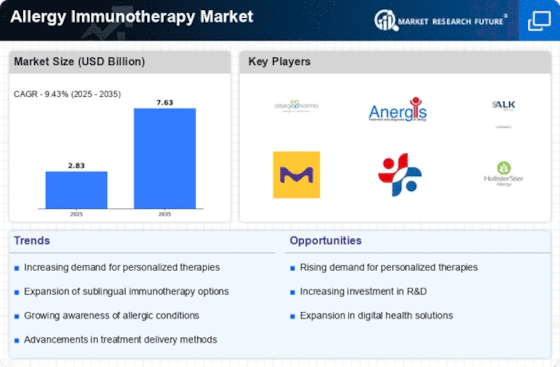
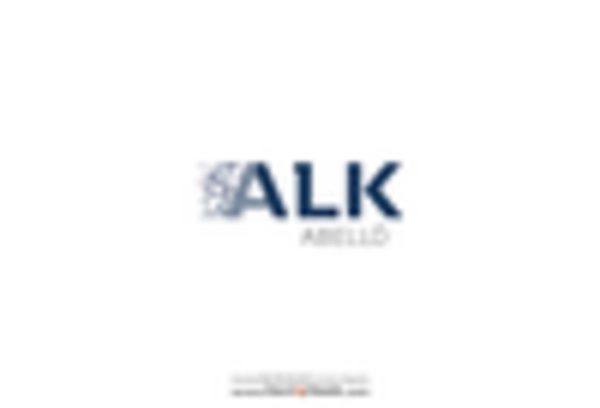
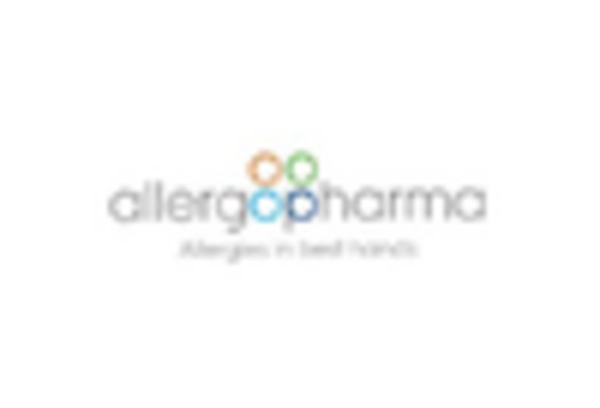
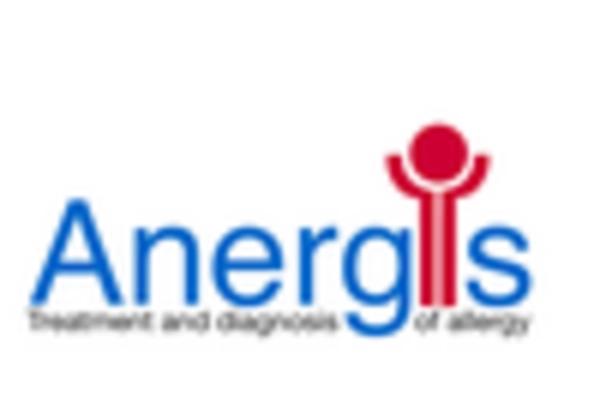
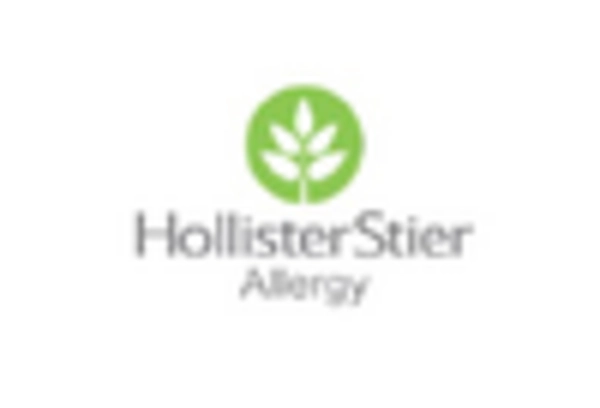
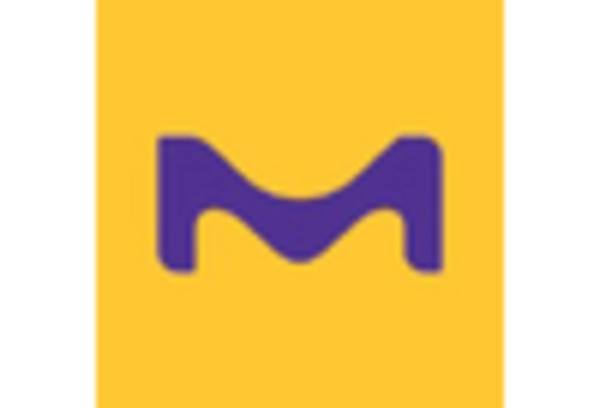
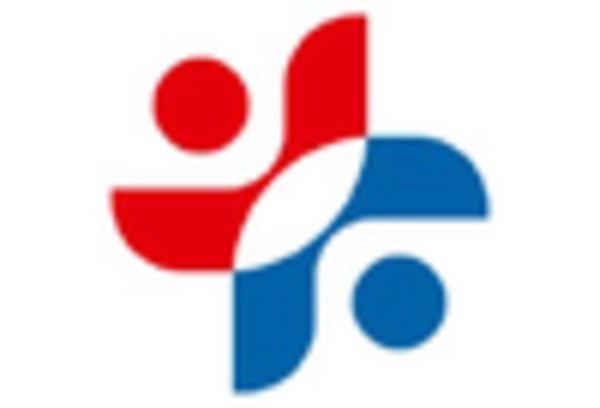









Leave a Comment